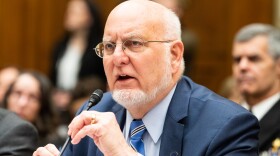
Carrie Feibel
Carrie Feibel is a senior editor on NPR's Science Desk, focusing on health care. She runs the NPR side of a joint reporting partnership with Kaiser Health News, which includes 30 journalists based at public radio stations across the country.
Previously, Feibel was KQED's health editor in San Francisco and the health and science reporter at Houston Public Radio. She has covered abortion policy and politics, the Affordable Care Act, the medical risks of rodeo, the hippie roots of the country's first "free clinic" and the evolution of drug education in the age of legal weed.
Feibel graduated from Cornell University and has a master's degree in journalism from Columbia University. In her print career, she worked at The (Bergen) Record and the Herald News in New Jersey, the Houston Chronicle and the Associated Press. She is currently a board member of the Association of Health Care Journalists.
Feibel was part of the coverage of Hurricane Ike, for which the Houston Chronicle was named a Pulitzer Prize finalist. At KQED, she edited a half-hour radio show on U.S. refugee policy that won an award in explanatory journalism from the Society of Professional Journalists.
-
Siblings often are tied together by logistical bonds, but can be careless or rough with one another because they assume their relationship is sturdier than it is. Some siblings are turning to therapy.
-
For our series Weekly Dose of Wonder, NPR's Carrie Feibel relays a new discovery involving humpback whales going to the undersea spa for some skin care.
-
New, untested abortion bans have made doctors unsure about treating some pregnancy complications. That's led to life-threatening delays, and trapped families in a limbo of grief and helplessness.
-
The Texas law bans abortions after a "fetal heartbeat" is detected, usually about six weeks into pregnancy. But doctors say that's not an actual medical term and it's being used inaccurately.
-
COVID-19 has now killed more Americans than WWII. That fact helps some people put the viral death toll in perspective, while others find it offensive. Historically, is it even a valid comparison?
-
Last spring, nurses and doctors traveled to New York and other COVID-19 hot spots to help overwhelmed hospitals. But with the virus spreading everywhere, hospitals now have nowhere to turn for help.
-
Protesters against systemic racism and police brutality have been met with an arsenal of 'less than lethal' weapons which can still seriously injure, sicken, and sometimes kill.
-
More than 60,000 health care workers have contracted the coronavirus, up from 9,000 in April. Workers say they face unnecessary risks because of ongoing shortages of protective gear like masks.
-
After weeks of keeping a low profile, the CDC's Dr. Robert Redfield tells NPR that data will determine future recommendations for wearing masks or easing back on social distancing.
-
The CDC expects the number of confirmed cases of Wuhan coronavirus in the U.S. to increase — but says the overall health risk of disease transmission in the country is low.









